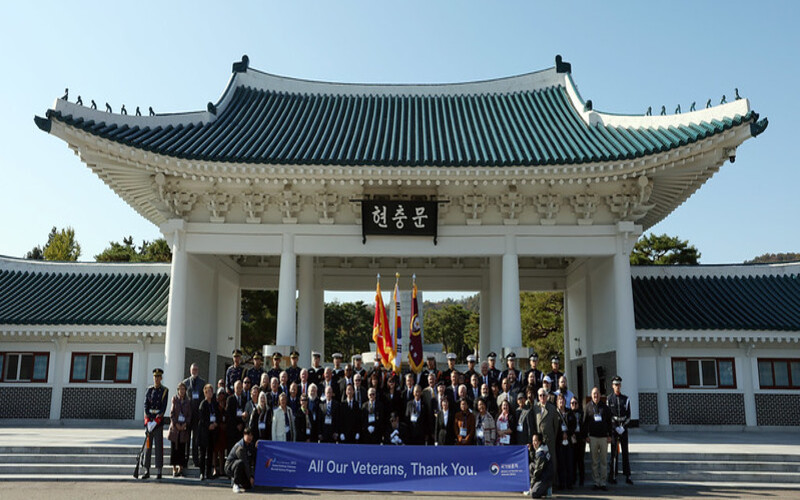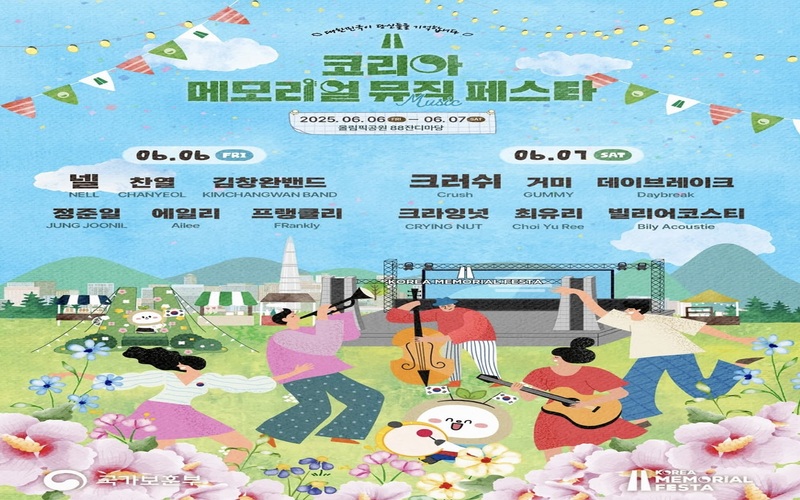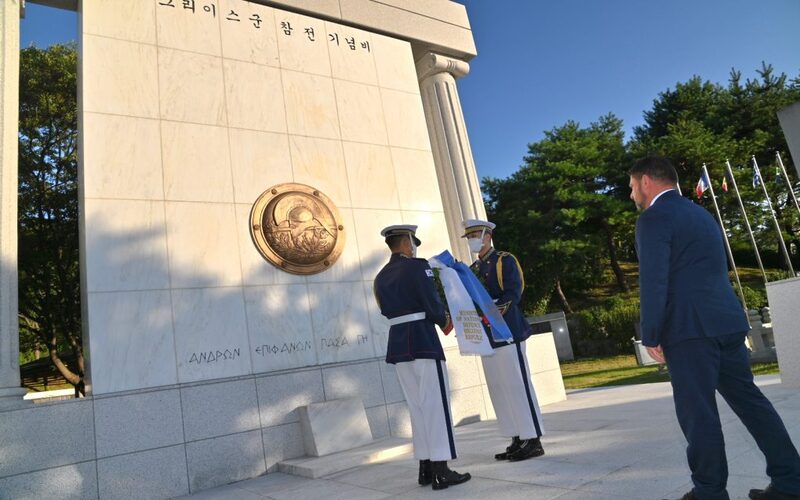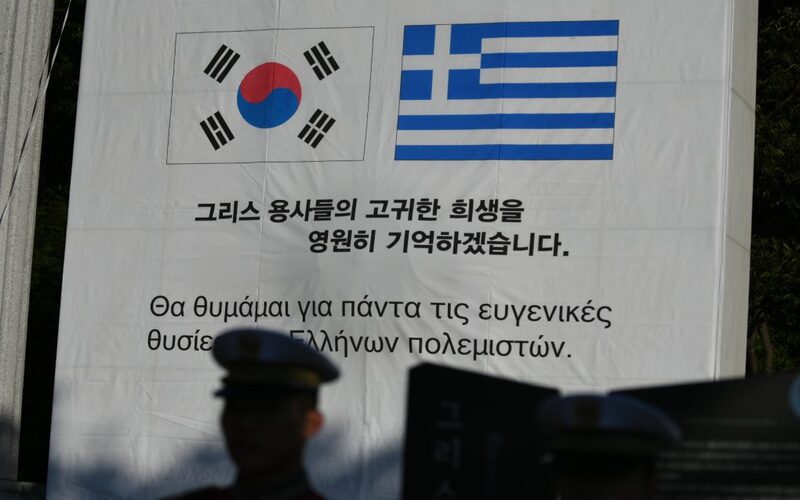[MISSION] A Hellenic Voice on Korea's Memorial Day: Memory, the Foundation of a Nation's Identity
2025-06-05The Memorial Day of the Republic of Korea (현충일) is celebrated every year on June 6th and constitutes the pinnacle of national commemorations. It was officially established in 1956, three years after the end of the Korean War (1950–1953), to honor the memory of both soldiers and civilians, who sacrificed themselves for the values of freedom and independence, offering the Korean nation a tangible hope for the continuity of their national history.
Each year on this specific day, flags fly at half-mast, and at 10:00 a.m., a siren sounds across the peninsula, calling the nation to a one-minute silence in honor of the fallen. Numerous ceremonies take place, the most important being the one held at the National Cemetery in Seoul, attended by the President of the Republic of Korea, government officials, military personnel, veterans, and relatives of the victims. Wreaths are laid, speeches are given, and the Memorial Day anthem is sung. The National Cemetery in Seoul serves as the resting place for all Koreans and foreigners who sacrificed their lives in the war, defying death, and also functions as a place of remembrance for veterans who experienced the brutality of the war. It is a sacred place where ancestors, comrades, and companions rest, leaving behind a legacy of unyielding spirit and love for the homeland. The location of the cemetery is unique, as nature itself seems to embrace Korea’s heroes, enhancing the sense of sacredness. More than 173,000 souls rest there, witnesses of the country’s liberation history and the hope for a future worthy of their struggle.

The Ministry of Patriots and Veterans Affairs of the Republic of Korea has declared the entire month of June as Memory Month, under the slogan: "The Yesterday They Protected, the Tomorrow We Will Bloom", and announced a two-part program. The first part is the "Path of Remembrance", with national ceremonies in Seoul (70th Memorial Day Ceremony on June 6 at the National Cemetery of Seoul) and in Daejeon (75th Korean War Anniversary Event on June 25 at the Daejeon Convention Center), as well as social support for veterans (free hearing aids, medical checkups). The second part concerns the "Path of Action", which includes cultural activities such as the Korea Memorial Music Festa (June 6 –7)and the Food Festa (June 13 –15). The Minister of Patriots and Veterans Affairs of the Republic of Korea, Kang Jung-ae, emphasized that the goal is to honor the heroes, strengthen national consciousness, and awaken the younger generations.

As a Greek, I feel compelled to refer to my ancestors and especially to all those young people who left behind their lives in Greek soil to travel to a distant and unfamiliar land, to help people fighting for their freedom and justice.
During the Korean War, the rest of the free world in 1950 was watching the developments on the Korean peninsula with horror because of the atrocities of the war. The United Nations Security Council issued Resolutions 83 and 84, urging 22 countries, including Greece, to send military and humanitarian aid to Korea. This was not an easy task for Greece, which during that time was trying to heal the wounds caused by the World War II and the subsequent civil wars, and was exhausted socially, and economically. Nonetheless, Greece responded, because Greeks had learned to bow to freedom and to fight for it, just as they did during World War II (1940–1945) and in 1821 during the Greek War of Independence, after all, it has been said that "Greeks fight like heroes." 10,457 Greeks took part in the Korean War, leaving behind 196 dead, 610 wounded, and, of course, missing persons.
Especially noteworthy is that the Greek Expeditionary Force and specifically the Sparta Battalion selflessly participated in one of the hardest battles of the Korean War, at the location known as “Outpost Harry”. No one could ever erase this battle from their memory. In fact, the surviving Greeks, having experienced the horror of conflict at that site, named it Outpost “Haros”, thinking of Charon («Χάρων» in greek) from Greek mythology—the ferryman who transported souls to Hades, the Greek Underworld. This name reminds us that death and hell reigned all around. During that operation, the Sparta Battalion lost 15 men, 36 were injured, and one is still considered missing today. Greece stood proudly by Korea and its people with courage and self-sacrifice.
To honor Greece’s contribution, the Korean government erected the Monument of the Greek Expeditionary Force in 1974 in the city of Yeoju, and in 2022, it was relocated to Yeongwol Park of Seoul. At the War Memorial of Korea in Seoul, there is a commemorative column dedicated to Greece’s participation, and inside the museum are inscribed the names of the Greek fallen. Finally, at the United Nations Cemetery in Busan, there is a marble monument erected by Greece, bearing the inscription: “Greece honoring its sons”, («Η Ελλάς τιμώσα τα τέκνα της» in greek) in memory of the fallen Greeks. These monuments keep alive the memory of the Greek soldiers. Moreover, the Greek Expeditionary Force is known for its philanthropic efforts in Korea, such as the construction of St. Nicholas Orthodox Cathedral in central Seoul, funded through donations.

Memorial days must not be seen merely as anniversaries, but as opportunities to remind ourselves of the value of freedom. Living in a society that is a victim of forgetfulness and utilitarianism makes it even more imperative that national holidays serve as a means of awakening and historical remembrance. History essentially asks us, the descendants of these heroes, to carry on their legacy and rise to the occasion, by living responsibly, respecting the values of democracy and humanism.
The one minute of silence that takes place on June 6th is enough to force us to reflect not only on the war on the battlefield but also on the other face of war. People died simply because they were in the wrong place at the wrong time, children were orphaned or died from hunger, fathers and mothers were killed. Memories are not merely shades of dignity, they form the national identity. And a nation without identity is not a nation.
Korea’s Memorial Day confronts the scourge of individualism and reminds citizens that the redefinition of identity does not need to wait for crises to emerge, but begins right now, in the life we live every day. If we are not genuine and dignified in the simple, monotonous routines of our daily lives, how is it possible to believe that in a potentially difficult situation we will rise above ourselves and our weaknesses? Apathy is not only the decline of history but also the betrayal of memory.
Undoubtedly, in the 21st century, the cause of people’s forgetfulness is the contradictions of daily life, lofty speeches, and countless theories. Self-interest and arbitrariness erode healthy societies, gaining ground rapidly, while wrapping the heroic struggles of our ancestors in hypocrisy. All this naturally makes me wonder: how much longer can I tolerate this immoral distortion? To restore human dignity and hope, societies must move forward with courage and determination. We, the country’s future, must take the lead in this struggle to reclaim our identity and, of course, we must not condemn ourselves for the mistakes of society or history.

The decline of a nation depends on how much truth and democracy we can withstand. So, you, who are reading this article: how much truth can you bear? Start first with the simple truths of your everyday life so that you can be able to arrive at the deeper truths of history, honor, and dignity.
Realism is not pessimism. Realism is salvation. Just imagine what miracles self-awareness can bring. A little food for thought today.
How about this article?
- Like0
- Support0
- Amazing0
- Sad0
- Curious0
- Insightful1


